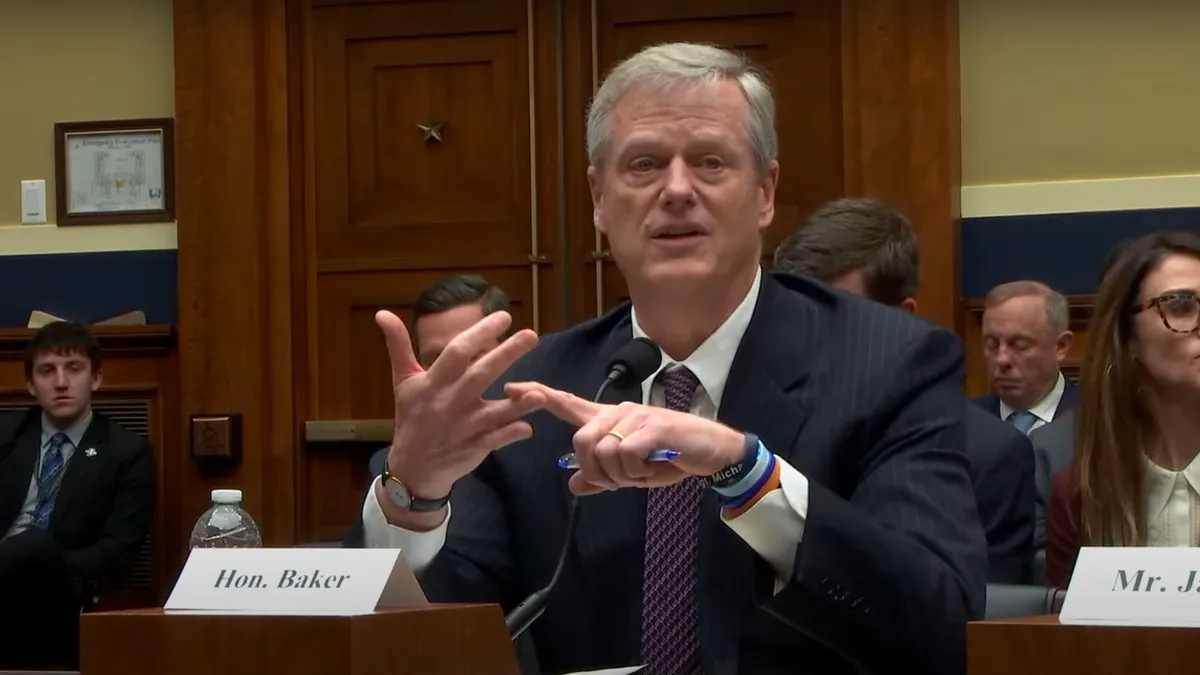Dive Brief:
- Federal lawmakers and collegiate sports representatives volleyed ideas Thursday for creating a national standard governing name, image and likeness, or NIL, deals involving college athletes.
- During a House subcommittee hearing, lawmakers discussed a draft bill unveiled by Republican Rep. Gus Bilirakis on Jan. 11. The proposal would create an independent regulatory body to oversee NIL procedures and establish national rules for how college athletes can earn money through these agreements.
- NCAA President Charlie Baker stressed the importance of federal legislation, though he took issue with some elements of the draft legislation. College athletes who testified, meanwhile, were divided on the proposal.
Dive Insight:
For most of the NCAA's history, the organization prohibited college athletes from monetizing their fame, asserting that they are college students first and athletes second.
But California passed legislation in 2019 authorizing NIL arrangements, setting off a legal domino effect that resulted in the NCAA in 2021 suspending its rules that had prohibited these deals.
Over 30 states have passed laws that permit student athletes to profit from NIL deals. But those rules can differ dramatically.
"NIL is great for players, and the change was long overdue," Bilirakis said Thursday. "At the same time, the sudden transition to NIL has enabled a Wild West environment where pay-for-play is rampant."
Republican Rep. Cathy McMorris Rodgers, chair of the House Energy and Commerce Committee, echoed his sentiment, calling the current NIL landscape a confusing legislative patchwork.
“It is unreasonable to expect student athletes to balance their studies while navigating a maze of complex and conflicting laws," she said. “They are put in an unwinnable position of running afoul of rules they would need a law firm to provide counsel on."
Bilirakis' proposal, known as the FAIR College Sports Act, aims to address those issues by creating standardized NIL rules. He introduced the bill last week with the support of two Democrats, Rep. Debbie Dingell and Sen. Ben Ray Lujan.
The legislation would ban athletics boosters and third party groups from compensating college athletes to entice them to play at specific colleges.
The bill would also establish the U.S. Intercollegiate Athletics Committee, a nongovernmental oversight group to dictate the rules governing NIL.
Lawmakers would appoint the committee’s board of directors. Board members would include current and former college athletes, sports industry professionals and representatives from colleges, athletics departments and intercollegiate conferences.
The NCAA has called for a national NIL standard, along with crafting its own policies. Earlier this month, the NCAA council governing Division I, its highest level of competition, approved a proposal that will require college athletes to report NIL deals to their colleges.
Baker advocated Thursday for standardized NIL contracts and for legal protections for student athletes entering into such agreements.
"Even with the actions we've taken and will continue to take, there remain threats to college sports we lack the legal authority to address," he said during the hearing, citing concerns that athletes could be exploited through NIL deals.
Baker, who has led the NCAA for less than a year, supported parts but not all of Bilirakis' draft bill. One pain point is the U.S. Intercollegiate Athletics Committee, whose proposed work Baker said should be handled by the colleges, conferences and the NCAA. Another is the legislation's ban on colleges entering into NIL agreements with athletes.
"As a former elected official, I understand the need for some level of public accountability but also share the concern of many with inserting government too deeply into activities such as sports," Baker said.
Last month, he laid out an NIL proposal that would allow Division I colleges to strike NIL deals with players and give colleges more flexibility around their recruiting policies.
The college athletes who testified Thursday had split views over the proposal.
Meredith Page, a student athlete on the volleyball team at Radford University in Virginia, backed the bill and its goal of creating a national standard.
"Guardrails help maintain the integrity of collegiate sports while offering student athletes the chance to capitalize on their personal brand," Page said. She also praised its proposed ban on student athletes being considered college employees.
But Chase Griffin, a quarterback on the University of California, Los Angeles’ football team, said the proposal would create too many regulatory hurdles for student athletes to reasonably navigate. He cited his experience entering into over 40 NIL agreements.
"NIL has gotten a bad rap in federal policymaking circles because some believe it is a nefarious pay-for-play scheme," Griffin said. "But in every other aspect of American life, the expectation is that if you work hard, play by the rules and create value, you deserve to share in that value."














